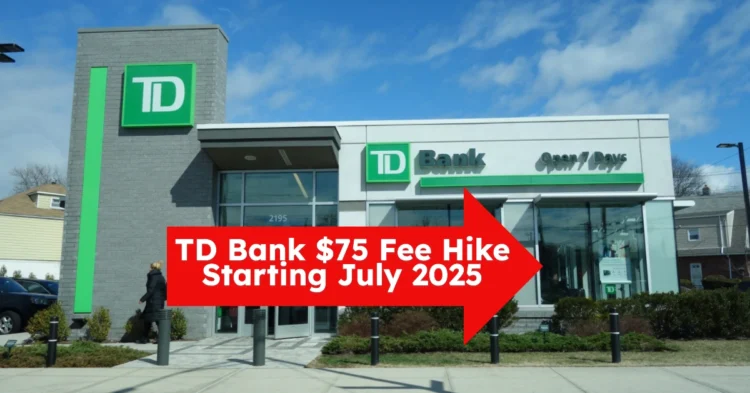A controversial TD Bank $75 fees hike is raising eyebrows among Canadian banking customers and financial observers. Starting July 1, 2025, TD Canada Trust will double its registered account transfer fee from $75 to $150, impacting customers who wish to move their Tax-Free Savings Accounts (TFSAs), Registered Retirement Savings Plans (RRSPs), or First Home Savings Accounts (FHSAs) to another financial institution.
This TD Bank $75 fees hike is more than just a routine administrative change—it’s being seen as yet another example of financial industry arrogance. After failing to retain client loyalty, TD is now charging more for those who decide to take their business elsewhere. Critics argue that such fees punish customers for making financially responsible decisions, like switching to providers with lower costs or better returns.
Table of Contents
A Hidden Fee with a Big Impact
The TD Bank $75 fees hike pushes the bank’s account transfer cost to the industry’s informal ceiling of $150—a fee that can represent a 1% hit on a $15,000 portfolio. For the average investor aiming for long-term gains of 5-6% annually, losing 1% to a single transaction is a significant blow.
Furthermore, this fee is layered on top of mutual fund management expense ratios (MERs), which typically range from 1.5% to 2% in bank-issued funds. These MERs are subtracted before returns are even shown to customers, making it harder for retail investors to grow their wealth over time.
TD Bank Layoffs 2025: Thousands of Jobs Cut as Part of Major Restructuring Plan in Canada and U.S.
TD’s Justification for the $75 Fees Hike
When questioned about the TD Bank $75 fees hike, the institution responded with a generic statement: “We regularly evaluate our product offering to align with customer’s needs.” TD claimed that the fee increase was based on processing costs, market conditions, and the value we provide our customers.
However, critics argue that this explanation rings hollow. If these fees truly reflected service value, there would be clear, corresponding improvements in client benefits. Instead, this TD Bank $75 fees hike is seen by many as a cash grab in an environment with little effective competition.
What Mark Carney’s Victory Means for Future Bank of Interest Rate Cuts
Alternative Providers Take a Stand
Paul Teshima, Chief Commercial Officer of Wealthsimple, took to LinkedIn to criticize the TD Bank $75 fees hike, pointing out that Wealthsimple does not charge account transfer fees. As one of the few viable alternatives to Canada’s Big Five banks, Wealthsimple’s zero-transfer-fee policy positions them as a more consumer-friendly option—even if their chequing interest rates and foreign exchange fees have room for improvement.
Teshima’s commentary reflects a broader frustration with an industry that profits from complexity and a lack of transparency. Account transfer fees like TD’s $75 hike disproportionately affect clients who are less financially sophisticated—often the very customers who need flexibility the most.
A Call for Open Banking
The TD Bank $75 fees hike also underlines the need for open banking—a regulatory framework that would allow Canadians to safely share their financial data with third-party providers. Open banking would lower the barriers to switching banks or investment firms, increasing competition and consumer choice.
Despite the clear benefits, Canada’s progress on open banking has been slow. Without it, fees like TD’s $150 transfer charge will continue to stifle consumer mobility and entrench the dominance of major financial institutions.
A Glimpse of Relief—And What It Could Mean
In contrast to the TD Bank $75 fees hike, the bank is also making a rare fee reduction: cancelling an e-transfer payment will no longer cost $5. While appreciated, this small move pales in comparison to the backlash sparked by the registered account fee increase.
The juxtaposition highlights the need for a broader review of bank fees in Canada. Consumers deserve a system where they aren’t penalized for seeking better financial services—and where innovation and transparency are rewarded.
Final Thoughts
The TD Bank $75 fees hike is more than an isolated fee adjustment—it’s a symbol of a larger systemic problem in Canada’s financial services sector. In an era where more consumers are becoming financially savvy, punitive charges like this hinder economic progress and exacerbate inequality.
With open banking on the horizon and fintech disruptors entering the market, traditional banks like TD will face increasing pressure to justify every dollar they charge. Until then, the TD Bank $75 fees hike serves as a reminder of why change can’t come soon enough.

